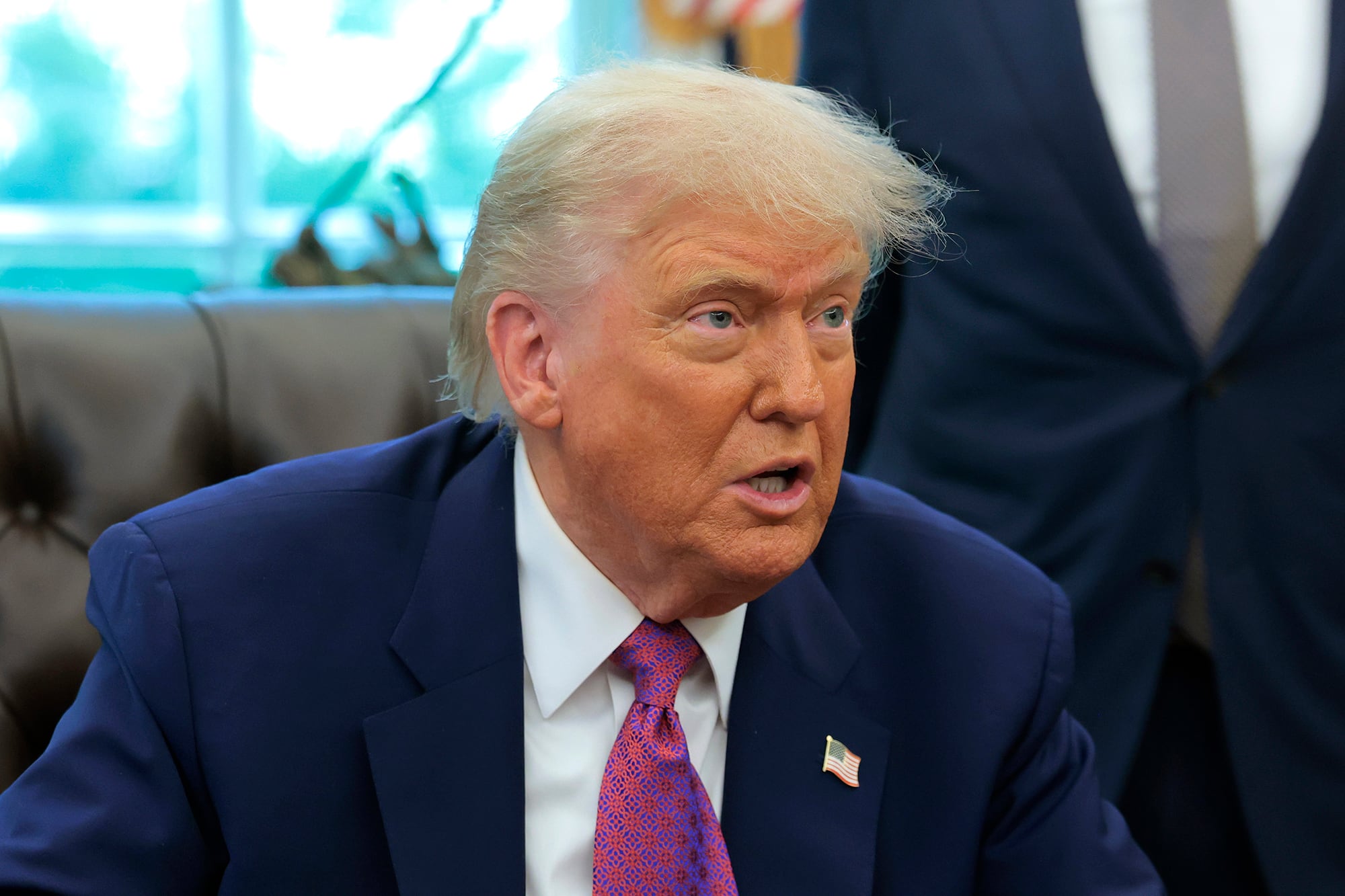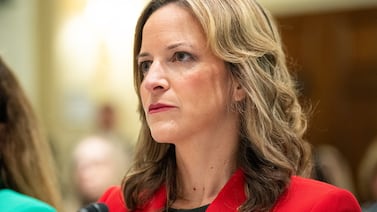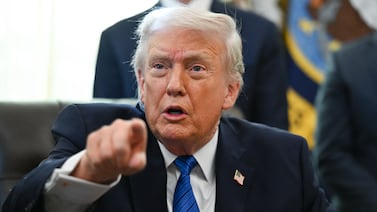Votebeat is a nonprofit news organization reporting on voting access and election administration across the U.S. Sign up for our free weekly newsletter to get the latest.
President Donald Trump issued a sweeping federal pardon on Sunday for Rudy Giuliani and dozens of others involved in efforts to overturn the results of the 2020 presidential election, including the so-called fake electors who participated in a scheme to cast electoral votes for Trump in states that he lost.
The pardons were announced by Justice Department Pardon Attorney Ed Martin on X, in a post that referred to the fake electors as “alternate electors.” Along with Giuliani, those pardoned included John Eastman and Sidney Powell, who were also members of Trump’s legal team, and Mark Meadows, who was Trump’s chief of staff.
“This proclamation ends a grave national injustice perpetrated upon the American people following the 2020 Presidential Election and continues the process of national reconciliation,” the announcement said.
The pardons are largely symbolic, since the people receiving them aren’t facing federal charges. Several of them face state charges, for which the president has no pardon power. Still, it represents another step by Trump to wipe away consequences for allies who participated in efforts to overrule the will of voters and overturn his 2020 election loss.
One of the first steps he took in his second term was to grant a blanket pardon to more than 1,500 people who attacked the U.S. Capitol on Jan. 6, 2021, to try to disrupt the certification of the 2020 results. Trump, who was impeached, and acquitted, on charges of inciting that attack, has praised the attackers and refused to acknowledge publicly that he lost the election.
Trump has also used executive orders to target lawyers and law firms involved in pursuing cases against Jan. 6 rioters, and investigations of his 2016 campaign and first-term administration.
“This is yet another expression of the fact that Donald Trump does not care for democracy,” Justin Levitt, a professor at Loyola Law School in California and former Justice Department official, said of the pardons.
Levitt said the broad language of the pardon might have an effect the administration did not intend: that it could also be read as absolving state election officials who Trump allies have said should be prosecuted for their roles in administering the 2020 election.
What was the ‘fake elector’ plot?
The fake elector plots sought to exploit ambiguities in the laws and processes that Congress uses to certify the Electoral College votes for president.
Presidential elections are determined ultimately by the votes of the 538 members of the Electoral College; a candidate needs 270 votes to win. Each state is represented by a certain number of presidential electors based on its population. Before the general election, each presidential nominee selects a slate of electors.
After the election, nearly all states award all their electoral votes to the winner of the popular vote in the state. Nebraska and Maine allocate them proportionally.
In 2020, Joe Biden won the popular vote in Democratic strongholds, as well as key swing states: Arizona, Georgia, Michigan, Nevada, New Mexico, Pennsylvania, and Wisconsin, and his electors in those states were then authorized to submit a certificate of their votes to Congress.
But attorneys with the Trump campaign urged alternate, or “fake,” electors in those states to cast votes for Trump and submit them to Congress, part of an effort to overturn the results on the grounds that the Biden’s victory was illegitimate. Courts, audits, and investigations have repeatedly found the results were sound.
After that, prosecutors in several states brought criminal charges against the electors who participated in the plan to submit electoral votes for Trump. Some of those cases are still ongoing. Here’s a look at where the cases stand in the key swing states:
Arizona
In Arizona, a grand jury in April 2024 indicted 18 people on nine criminal charges, including six counts of conspiracy; fraudulent schemes and artifices; fraudulent schemes and practices; and forgery. The indictment alleged that they conspired to prevent the lawful transfer of presidency when they claimed to be the “duly elected and qualified Electors” from Arizona.
The case hit procedural roadblocks when Kris Mayes, Arizona’s Attorney General, was ordered by a judge to return to the grand jury for a fresh hearing because jurors weren’t shown the full text of the Electoral Count Act of 1887. An appeals court recently declined to hear an appeal of that order.
Georgia
Three of Georgia’s 16 fake electors were charged as part of a sweeping election interference case brought by Fulton County District Attorney Fani Willis in 2023. Eight others were granted immunity in exchange for their cooperation.
Willis’ case was derailed, however, due to allegations of a romantic relationship between her and one of the top prosecutors on the case. Willis was removed as prosecutor. The state Supreme Court declined to hear Willis’ appeal of that decision, and the case is now on hold. A Fulton County Superior Court judge has issued a Nov. 14 deadline for prosecutors to appoint someone new to take up the case, warning that the case will be dismissed unless a lead prosecutor is named or a valid extension is requested.
Michigan
In Michigan, Attorney General Dana Nessel, a Democrat, charged 16 people with eight felonies each in 2023 in the fake elector case, but one had his charges dropped in exchange for his cooperation.
In September, the remaining 15 defendants had their felony charges dismissed by Judge Kristen Simmons, of 54-A District Court in Lansing, who said she didn’t believe there was enough evidence to prove intent.
Nessel has since said she is not ruling out an appeal of Simmons’ decision. In a statement Monday, she called Trump’s pardons part of an “all-out assault against American democracy.” She said her office is trying to get court transcripts from the day Simmons dismissed the charges.
Once her office has the transcript of Simmons’ ruling, she said, it will decide whether to challenge it.
Meanwhile, the accused have largely remained active in conservative politics in Michigan.
Defendant Meshawn Maddock, for example, came second in the race for Michigan GOP chair last year after winning Trump’s endorsement. Stan Grot, another accused elector, won an uncontested race to remain Shelby Township clerk in November 2024, even though he isn’t allowed to administer elections while his charges are pending.
Nevada
Nevada’s six fake electors were charged by the state attorney general in 2023 with felony counts of “offering a false instrument for filing” and “uttering a forged instrument.”
But a judge dismissed the case just a few months before the 2024 election, saying that it had been brought in the wrong county.
Aaron Ford, Nevada’s attorney general, refiled the two types of fraud charges in the proper county in December 2024, but the statute of limitations on one had passed.
Pennsylvania and New Mexico
Unlike the participants in other states, the purported Trump electors in Pennsylvania and New Mexico did not face criminal charges because of an important legal caveat they added to their documents.
Electors in both states said their votes for Trump should be counted only if pending court cases were resolved in Trump’s favor.
The elector certification from Trump’s 20 Pennsylvania electors said the votes they were casting should be counted only if a court found that they were the “duly elected and qualified Electors.”
New Mexico’s five Trump electors wrote in their certificate that they were casting their votes “on the understanding that it might be later determined that we are the “duly elected and qualified Electors.”
Prosecutors in both states have said these caveats prevented the electors’ prosecution.
Wisconsin
In Wisconsin, Attorney General Josh Kaul filed 11 felony charges in 2024 against each of three Trump aides associated with the state’s fake elector scheme. The case is ongoing.
The judge overseeing the case has refused efforts by the three defendants — attorneys Kenneth Cheseboro and James Troupis, and former Trump aide Mike Roman — to dismiss the charges. None have been granted. The charges relate to felony forgery and forgery meant to defraud the Republican electors who cast votes for Trump despite Biden winning the state.
Kaul hasn’t charged the 10 Republican electors who signed the fake elector documents. But they were sued in civil court, eventually reaching a settlement that included them issuing a statement saying Biden won Wisconsin. Separately, they vowed never to act as presidential electors again.
Carter Walker is a reporter for Votebeat in partnership with Spotlight PA. Contact Carter at cwalker@votebeat.org.



